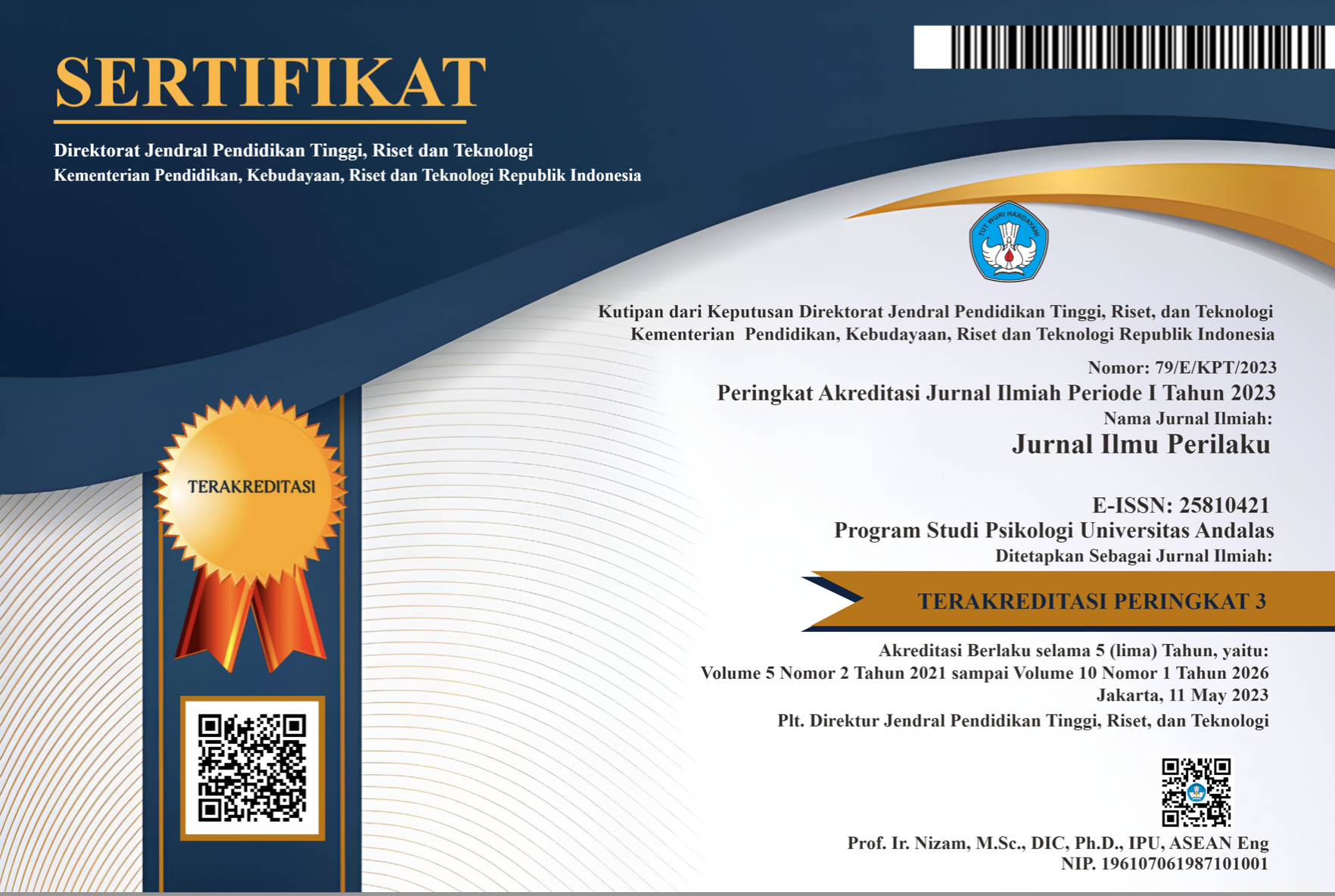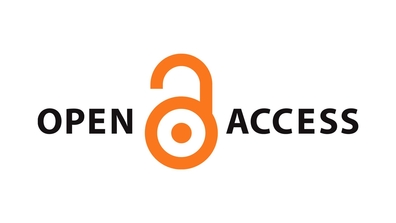Peran Kepribadian Proaktif dan Resiliensi terhadap Keterikatan Kerja Petugas Pemadam Kebakaran dan Penyelamatan
Abstract
Work engagement is an important aspect, especially for employees who have a job with a high level of risk, to minimize the impact of risks and maximize their performance. Therefore, this research investigated the role of proactive personality and resilience in work engagement. The method was a quantitative approach with a correlational research design. The population in this study were firefighters and rescue personnel in Yogyakarta. The sampling technique used was saturation sampling with a sample size of 167 individuals. Data were collected using the Modified UWES by Aulia et al. (2019), the Modified PPS by the author, and the Resilience Scale by Aulia et al. (2022). The analytical technique used was multiple linear regression. The study's results indicate that proactive personality and resilience played a highly significant role in work engagement. A proactive personality significantly and positively influences work engagement, as does resilience. Both proactive personality and resilience contributed effectively to work engagement by 61.2%, whereas the remaining 38.8% was determined by other factors not discussed in this study. This finding can be used by organizations and companies to understand their employees related to work attachment to increase human resources within the scope of work.
Downloads
References
Aini, A. N. (2016). Analisis risiko kerja dan upaya pengendalian bahaya pada petugas pemadam kebakaran di dinas pemadam kebakaran kota semarang. Jurnal Kesehatan Masyarakat, 4(1), 227-283. https://ejournal-s1.undip.ac.id/index.php/jkm.
Ali, N. (2021). Peran beban kerja dalam memoderasi pengaruh religiusitas terhadap keterikatan kerja. Jurnal Ekonomi, Keuangan dan Perbankan Syariah, 5(1), 42-56. https://doi.org/10.33379/jihbiz.v5i1.866.
Amir, S., & Kant, V. (2017). Sociotechnical resilience: A preliminary concept. Risk Analysis, 38(1), 8–16. https://doi.org/10.1111/risa.12816.
Angelina, S., & Suyasa, T. (2023). Peran resiliensi sebagai mediator pada hubungan afek negatif dan keterikatan kerja. Gema Ekonomi, 12(2), 686-698. https://doi.org/10.55129/gemaekonomi.v12i2.2624.
Anggiadinata, N. S., & Kurniawan, I. N. (2015). Peran theistic sanctification of work terhadap work engagement pada karyawan pt. Krakatau steel (persero) tbk. Universitas Islam Indonesia, Yogyakarta, Indonesia. https://doi.org/10.13140/RG.2.2.26751.25765.
Astika, N. F. I., & Saptoto, S. (2016). Peran resiliensi dan iklim organisasi terhadap work engagement. Gajah Mada Journal of Psychology 1, 38-47. https://scholar.google.co.id/scholar?hl=id&as_sdt=0%2C5&q=Astika%2C+N.+F.+I.%2C+%26+Saptoto%2C+S.+%282016%29.+Peran+resiliensi+dan+iklim+organisasi+terhadap+work+engagement.+Gajah+Mada+Journal+of+Psychology+1%2C+38-47.&btnG=.
Aulia, A., Nugraheni, R. P., & Baskoro, W. N. (2022). The effect of self-efficacy, perceived organizational support and resilience on the work engagement of satpol pp members in yogyakarta city. International Conference of Psychology Universitas Ahmad Dahlan, 2(1), 27-23. http://seminar.uad.ac.id/index.php/ICMPP.
Aulia, A., Sutanto, A., & Hidayat, A. C. (2019). Determinants of work engagement for TNI-AD (indonesian armed forces-army) personnel. ANIMA Indonesian Psychological Journal, 35(1), 35-55. https://doi.org/10.24123/aipj.v35i1.2881.
Badan Penanggulangan Bencana Daerah (BPBD) Daerah Istimewa Yogyakarta. (2020). Data dan informasi bencana di indonesia (dibi) diy 2020. Diakses dari Situs Web BPBD DIY, http://bpbd.jogjaprov.go.id/dibi-data-informasi.
Badan Penanggulangan Bencana Daerah (BPBD) Daerah Istimewa Yogyakarta. (2023). Bedah data kebencanaan diy tahun 2022. Diakses dari Situs Web BPBD DIY, http://bpbd.jogjaprov.go.id/berita/bedah-data-kebencanaan-diy-tahun-2022.
Bakker, A. B., & Demerouti, E. (2007). The job demand-resources model: State of the art. Journal of Managerial Psychology, 22(3), 309-328. https://doi.org/10.1108/02683940710733115.
Bakker, A. B., & Demerouti, E. (2014). Job demands–resources theory. Resources, Coping, and Control, 3(2). https://doi.org/10.1002/9781118539415.wbwell019.
Bakker, A. B., & Oerlemans, W. G. M. (2016). Momentary work happiness as a function of enduring burnout and work engagement. The Journal of Psychology, 150(6), 755-778. https://dx.doi.org/10.1080/00223980.2016.1182888.
Bakker, A. B., Schaufeli, W. B., Leiter, M. P., & Taris, T. W. (2008). Work engagement: An emerging concept in occupational health psychology. Work & Stress, 22(3), 187–200. http://dx.doi.org/10.1080/02678370802393649.
Bateman, T. S., & Crant, J. M. (1993). The proactive component of organizational behavior: A measure and correlates. Journal of Orgganizational Behavior, 14(2), 103-118. https://doi.org/10.1002/job.4030140202.
Cao, X., & Chen, L. (2019). Relationships among social support, empathy, resilience and work engagement in haemodialysis nurses. International Council of Nurses, 66(3), 366-373. https://doi.org/10.1111/inr.12516.
CNN Indonesia. (2022). 17.768 kasus kebakaran di 2021, 5.274 diantaranya akibat korsleting. Diakses dari Situs Web CNN Indonesia, https://www.cnnindonesia.com/nasional/20220301134907-20-765357/17768-kebakaran-di-2021-5274-di-antaranya-akibat-korsleting
Connor, K. M., & Davidson, J. R.T. (2003). Development of a new resilience scale: The connor davidson resilience scale (CD-RISC). Article in Depression and Anxiety, 18(2), 76- 82. https://doi.org/10.1002/da.10113.
Gunawan, H. (2012, September 18). Loyalitas karyawan di indonesia masih rendah. Kontan.co.id. https://industri.kontan.co.id/news/loyalitas-karyawan-di-indonesia-masih-rendah.
Iswati, N. P., & Mulyana, O. P. (2021). Hubungan antara kualitas kehidupan kerja dengan keterikatan kerja pada keryawan pt.x. Character: Jurnal Penelitian Psikologi, 8(8), 116-128. https://ejournal.unesa.ac.id/index.php/character/article/view/41684.
Joo, B. K., & Ready, K. J. (2012). Career satisfaction: The influences of proactive personality, performance goal orientation, organizational learning culture, and leader-member exchange quality. Career Development International, 17(3), 276-295. https://doi.org/10.1108/13620431211241090.
Kurniawati, I. (2014). Masa kerja dengan job engagement pada karyawan. Jurnal Ilmiah Psikologi Terapan, 2(2), 311-324. https://ejournal.umm.ac.id/index.php/jipt/article/view/2005.
Li, M., Liu, Y., Liu, L., & Wang, Z. (2016). Proactive personality and innovative work behavior: The mediating effects of affective states and creative self-efficacy in teachers. Current Psychology, 36, 697-706. https://doi.org/10.1007/s12144-016-9457-8.
Mackay, M. M., Allen, J. A., & Landis, R. S. (2017). Investigating the incremental validity of employee engagement in the prediction of employee effectiveness: A meta-analytic path analysis. Human Resource Management Review, 27(1), 108–120. http://dx.doi.org/10.1016/j.hrmr.2016.03.002.
Marliani, R. (2019). Metode penelitian psikologi. Bandung: CV Pustaka Setia.
Periantalo, J. (2016). Penelitian kuantitatif untuk psikologi. Yogyakarta: Pustaka Pelajar.
Porfeli, E. J., & Savickas, M. L. (2012). Career adapt-abilities scale-USA form: Psychometric properties and relation to vocational identity. Journal of Vocational Behavior, 80(3), 748-753. https://doi.org/10.1016/j.jvb.2012.01.009.
Prasetyo, Y., & Farhanindya, H. H. (2021). Resiliensi dengan work engagement pada karyawan lapangan. Cermin: Jurnal Penelitian, 5(2), 350-361. https://doi.org/10.36841/cermin_unars.v5i2.1356.
Randolph, K. L., & Dahling, J. J. (2013). Interactive effects of proactive personality and display rules on emotional labor in organizations. Journal of Applied Social Psychology, 43(12), 2350–2359. https://doi.org/10.1111/jasp.12184.
Rizkiani, B. E., & Sawitri, D. R. (2015). Kepribadian proaktif dan keterikatan kerja pada karyawan PT PLN (persero) distribusi jawa tengah dan daerah istimewa yogyakarta. Jurnal Empati, 4(4), 38-43. https://ejournal3.undip.ac.id/index.php/empati/article/view/13549.
Rokan, S. M. (2018). Pengaruh resiliensi terhadap keterikatan kerja pada perawat gerontik di panti werdha. Universitas Sumatera Utara, Indonesia. https://repositori.usu.ac.id/handle/123456789/10337.
Schaufeli, W. B., & Bakker, A. B. (2003). Utrecht work engagement scale: Preliminary manual. Department of Psychology. The Netherlands: Utrecht University.
Schaufeli, W. B., Bakker, A. B., & Salanova, M. (2006). The measurement of work engagement with a short questionnaire: A cross-national study. Educational and psychological measurement, 66(4), 701-716. https://doi.org/10.1177/0013164405282471.
Shafwani, R., Lubis, H. S., & Salmah, U. (2012). Gambaran risiko pekerjaan petugas pemadam kebakaran di dinas pencegah pemadam kebakaran (DP2K) kota medan. Medan: Universitas Sumatera Utara. https://www.neliti.com/publications/14642/gambaran-risiko-pekerjaan-petugas-pemadam-kebakaran-di-dinas-pencegah-pemadam-ke.
Siliyah, N., & Hadi, C. (2021). Pengaruh resiliensi terhadap work engagement pada guru. Buletin Riset Psikologi dan Kesehatan Mental, 1(2), 1152-1160. https://dx.doi.org/10.20473/brpkm.v1i2.28469.
Simanullang, R. T. W., & Ratnaningsih, I. Z. (2018). Hubungan antara kesejahteraan psikologis dengan keterikatan kerja pada perawat instalasi rawat inap di rumah sakit x kota semarang. Jurnal EMPATI, 7(4), 290-296. https://doi.org/10.14710/empati.2018.23479.
Sofyanty, D. (2018). Pengaruh kontrak psikologis dan psychological well being terhadap keterikatan abdi. Jurnal Widya Cipta, 2(1), 96-102. https://ejournal.bsi.ac.id/ejurnal/index.php/widyacipta/article/view/2983.
Sugara, A. (2020). Kepribadian proaktif dan work engagement pada relawan. Universitas Islam Negeri Sunan Ampel, Surabaya, Indonesia. http://digilib.uinsby.ac.id/43683/.
Sugiyono. (2019). Metode penelitian pendidikan. Bandung: Alfabeta.
Tims, M., Bakker, A. B., & Derks, D. (2012). Development and validation of the job crafting scale. Journal of Vocational Behavior, 80, 173–186. https://doi.org/10.1016/j.jvb.2011.05.009.
Wang, Z., Li, C., & Li, X. (2016). Resilience, leadership and work engagement: The mediating role of positive affect. Social Indicators Research, 132(2), 699–708. https://doi.org/10.1007/s11205-016-1306-5.
The non-commercial use of the article is governed by the Creative Commons Attribution license as currently displayed on Creative Commons Attribution-NonCommercial-ShareAlike 4.0 International License.
JIP's spirit is to disseminate articles published are as free as possible. Under the Creative Commons license, JIP permits users to copy, distribute, display, and perform the work for non-commercial purposes only. Users will also need to attribute authors and JIP on distributing works in the journal.
Please find the rights and licenses in Jurnal Ilmu Perilaku (JIP).
- License
The non-commercial use of the article will be governed by the Creative Commons Attribution license as currently displayed on Creative Commons Attribution-NonCommercial-ShareAlike 4.0 International License.
- Author’s Warranties
The author warrants that the article is original, written by stated author(s), has not been published before, contains no unlawful statements, does not infringe the rights of others, is subject to copyright that is vested exclusively in the author and free of any third party rights, and that any necessary written permissions to quote from other sources have been obtained by the author(s).
- User Rights
JIP's spirit is to disseminate articles published are as free as possible. Under the Creative Commons license, JIP permits users to copy, distribute, display, and perform the work for non-commercial purposes only. Users will also need to attribute authors and JIP on distributing works in the journal.
- Rights of Authors
Authors retain the following rights:
- Copyright, and other proprietary rights relating to the article, such as patent rights,
- The right to use the substance of the article in future own works, including lectures and books,
- The right to reproduce the article for own purposes, provided the copies are not offered for sale,
- The right to self-archive the article.
- Co-Authorship
If the article was jointly prepared by other authors, the signatory of this form warrants that he/she has been authorized by all co-authors to sign this agreement on their behalf, and agrees to inform his/her co-authors of the terms of this agreement.
- Termination
This agreement can be terminated by the author or JIP upon two months’ notice where the other party has materially breached this agreement and failed to remedy such breach within a month of being given the terminating party’s notice requesting such breach to be remedied. No breach or violation of this agreement will cause this agreement or any license granted in it to terminate automatically or affect the definition of JIP.
- Royalties
This agreement entitles the author to no royalties or other fees. To such extent as legally permissible, the author waives his or her right to collect royalties relative to the article in respect of any use of the article by JIP or its sublicensee.
- Miscellaneous
JIP will publish the article (or have it published) in the journal if the article’s editorial process is successfully completed and JIP or its sublicensee has become obligated to have the article published. JIP may conform the article to a style of punctuation, spelling, capitalization, referencing and usage that it deems appropriate. The author acknowledges that the article may be published so that it will be publicly accessible and such access will be free of charge for the readers.










